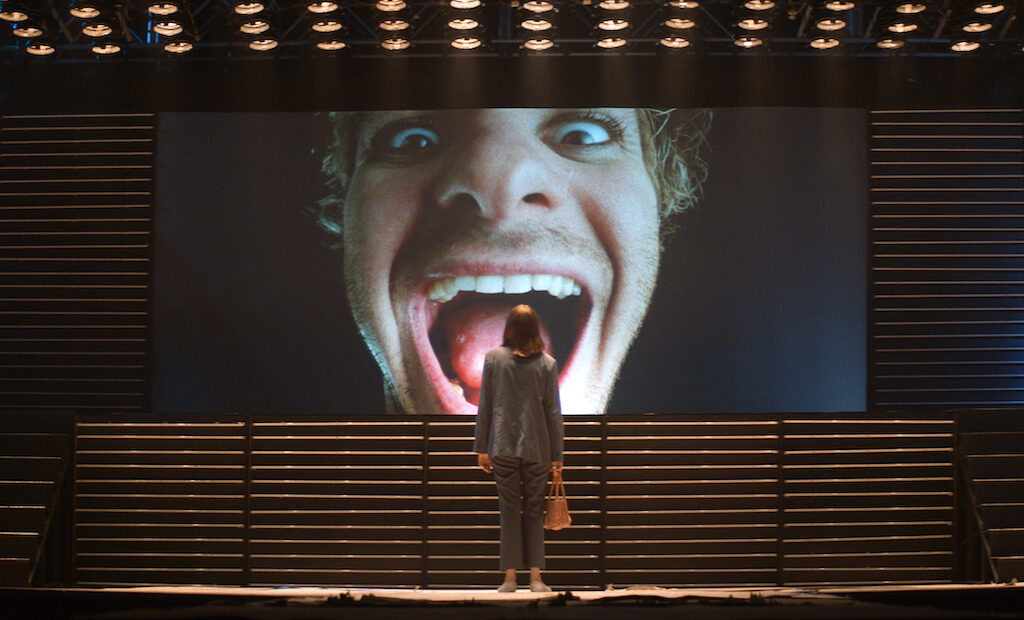Mainstream: Nat Wolff on the dangers of social media, Andrew Garfield’s performance and Gia Coppola’s vision

Mainstream is the story of a young woman stuck working as a comedy club bartender with her best friend Jake (Nat Wolff) and unsure of her path in life. One day she meets Link (Andrew Garfield), a mysterious man who she films while he delivers anti-mainstreams rants. These videos become viral and the three decide to form a creative partnership. However, as a result of their success, Link quickly becomes the epitome of everything he once denounced, creating unethical controversy. We spoke with Wolff about his character Jake as well as working with Gia Coppola again and the negative people of social media on young people.
Hello Nat, how are you doing?
Nat: I’m doing as good as I can, you know, crazy times, I wish I could have been in Venice with those guys, but, you know, you do as well as you can day by day.
Are you in the US now?
Nat: I’m in LA. But, but I’m from New York.
How did you get involved with Mainstream?
Nat: I was in Gia’s debut, Palo Alto, and we had a magical experience on that movie and pretty soon after she started bringing up Mainstream. So I kind of read every draft since the beginning. You know I, I would do anything Gia wanted to do.
I think she said she wrote the character for you, and it’s also based on you playing a song to her called Winter Baby?
Nat: Yeah, I played this song Winter Baby and she said “oh, we got to put that in the movie,” and she kind of wanted to work backwards from there. I thought that was a really cool way to work. She’s such a special artist and person and she takes such big risks in what she does because she’s an artist so I would love to work with her for my life.
How is Gia on the set? Has she changed since Palo Alto?
Nat: She’s magical because she does a lot by saying a little. She’s quietly guiding this ship, she’s a very softly spoken person and it makes for a really creative atmosphere, because I think she brings out the best in other people. As opposed to somebody that loves to hear the sound of their own voice. She’s the opposite.
At the beginning, your character Jake is part of the gang, but then he has a change of heart considering how things are going. How much of you is in that character and how much did you bring to it, and what is your opinion of what they were creating, because it’s quite controversial?
Nat: I hope to think that there’s a part of me that’s like Jake. I found him to be the moral centre of the movie. He’s the moral compass. He really could see the big picture of what they were doing, and at first he was excited to be a part of it but then he had to sound the alarm when he realised that it was headed for a disaster, artistically and ethically. And I think he represented the aspect that’s inside of everyone which sometimes is ignored but has to be listened to. He sees the truth and is clear-eyed and not blinded by ambition. He’s more focused on artistic integrity and moral integrity: those are the most important things to him. He doesn’t want to compromise. I felt like Jake was a version of myself that I wish took hold more than it does. He is a very solid person, but obviously part of Jake’s struggle in the movie is that he’s pining for Maya’s character. But there’s this whole other side to him, he is a true blue, good natured, morally responsible man.
What do you think of Link? He’s trying to critique people’s attachment to social media. Is he the bad guy or does he have something true to say that people should listen to?
Nat: First of all, I think it’s just the most incredible performance by Andrew. He is somehow able to play this dark, intensely damaged, wild, captivating person while somehow making him watchable. It makes you very conflicted about whether you’re supposed to route for him or not. It’s a really daring, beautiful performance, super inspiring for me. I think Link starts off, like all of us, as somebody who wants to be a part of good change in, in the world and culture, and then kind of starts to buy his own myth and his own press. Then he sort of starts to become less and less of a good person and that was really, really interesting to watch because I think it is the arc of our time in a lot of ways. Social media starts off as this thing that’s supposed to be connecting us, and bringing us closer together, and then it turns on us, becoming this thing that creates a lot of the anxiety and depression and pain.
Do you spend a lot of time on social media?
Nat: I had to delete the apps off of my phone because about three years ago, four years ago I was encouraged by a record label and then by a movie studio to basically be more active on social media in order to help with the promotion of a film. So I thought, you know, what’s the harm in that? And it felt like it was part of my job and then after about three weeks of trying to be more active I realised I was waking up in the morning and the first thing I would do would be to check the social media. I thought: this is crap, it’s full-blown addiction. So I deleted it off my phone and set some boundaries for myself because I think social media is a wonderful tool in a lot of ways if you look at Arab Spring, or when you wanted to find where the protests were during the first couple months after George Floyd was killed. There’s a lot of great things that come out of it, but it can be really dangerous.
So I think it should be something that comes with a warning label, there should be studies done that show what it does to your brain and then, hopefully, especially for kids, a way to make it so it doesn’t eat up your self-esteem and your confidence and who you are and this pursuit of being the social media version of yourself. Social media can be a really dark thing.
Now I share social media accounts with my brother Alex for our music careers. Those accounts would also give updates on our acting careers and sometimes also help link people to donate to a charity. But in terms of day-to-day, using social media to create this other version of yourself, nope.
Do you think a film like Mainstream help people understand the negative impact of social media and reflect on the actual lack of message and content from the figures they follow?
Nat: I think Mainstream deals with a lot of themes that people do already know about, in terms of social media being unhealthy. But I think it does it in a very powerful and creative way. I think the conversation that my parents are going to have when this movie comes out when they walk out of the theatre is going to be completely different from the conversation that two teenagers are going to have when they walk out. But I think that they’re both going to be valid and worthy conversations.
Later on this year we are going to see you in The Stand. What can you tell us about it?
Nat: The Stand was such a strange experience because we finished filming on 5th March, this show about a pandemic, and on 12th March I was in quarantine [laughs] in LA because of a pandemic. So it was a really strange thing to have happened. Obviously, The Stand is a way-exaggerated version of a pandemic gone wild throughout the world, but there were some striking similarities to scenes that I had shot where I was throwing lit toilet paper out of a jail cell, and then I was reading about the exact same thing happening in Europe. I would say that The Stand is the most fun that I have ever had playing a character because my character Lloyd is such an extremely evil, pathetic, but also, somehow redeemable guy that kind of gave me complete freedom as an actor to go in any direction. So I had a f*****g blast. I also had a blast with the other actors, especially Alexander Skarsgård; he was incredible.
And your directorial debut Youngest?
Nat: Yeah, it was amazing. I have always wanted to direct my girlfriend’s little sister because she is this magical little person. She’s nine now but she was seven when we filmed and I thought: I know what happens when kids get to be eight or nine, they get more self-conscious and they change, so I really wanted to capture this magical person at this age. So I wrote this script for her to be in it and I did it with all my friends. It couldn’t have been a more fulfilling or exciting experience.
Filippo L’Astorina, the Editor
























Facebook
Twitter
Instagram
YouTube
RSS